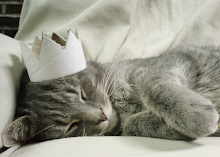'Please, take one of mine," said he, 'for I do not need two.'
I wondered why I made this strange cartoon, but then I remembered two things that recently happened in my life.
1. I had just studied a couple days ago, the complicated halakha of whether it was good and whether permissible to donate organs.
2. This week I heard that my friend of just 20 years is now finally blind. He lost one eye early to childhood cancer and had been battling it in the second since. He had fluctuations of blindness and, after surgeries/cleanings, sight again. Now he has finally has lost his sight irreversibly.
Fortunately, he has kind and dedicated parents who soften the physical loss and deep emotional pain of his tragedy. Once, I remember, when he was six, his mother and he, my son and I, were late for somewhere and about to hop in a taxi. He broke down in fear and trembling (not a euphemism), and his mother explained he had come to associate taxi rides with his extremely painful treatments. We went by subway.
All that is left for his family is waiting. One of the old signs of the anointed Jewish king is that he will specifically heal the blind.
We experience the story of our waking world as we live but we need to make sense of it on a personal level, so we dream. We obliquely confront our fears, obstacles, setbacks and accomplishments in our dreams. The obliqueness softens it, makes it easier to approach. A mean schoolteacher becomes a werewolf chasing us through a library of books, or perhaps we fly over our school like Peter Pan. The death of our family dog becomes Pinocchio leaving us to join the army. Getting a Rhodes scholarship to study at Oxford becomes, well, whatever it becomes. I wouldn't know, my scholarship must have been lost in mail along with my Hogwarts acceptance letter.
Another way of dealing with one's life situations and experiences is though the creative arts. Tolkien wove his gritty war story of the rings after suffering though ground warfare in WWI, Charles Schulz dealt with his relationship with his wife by acting it out in Schroeder - Lucy cartoons, and I here today.
Still another way we safely process our fears is by sharing others' creativity in their novels, films and cartoons. Here the audience safely deals with fears is a way abstract to their lives. That is why scary stories are so popular. Even when the stories are true as with your parents' retelling their childhood memories or in biographies, we are still safe as we hear them.






No comments:
Post a Comment